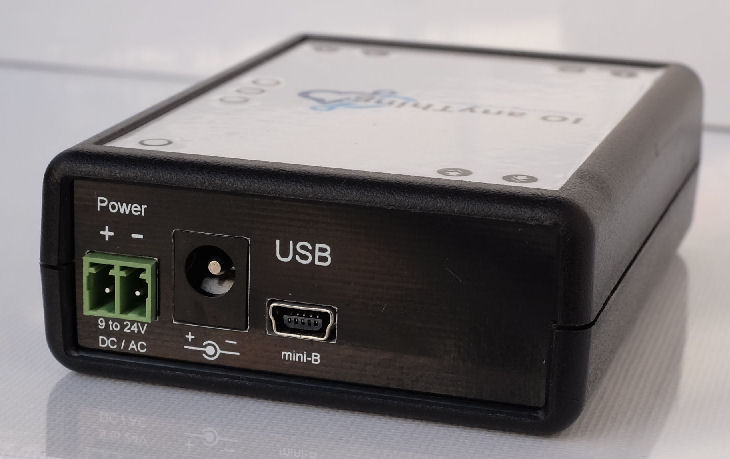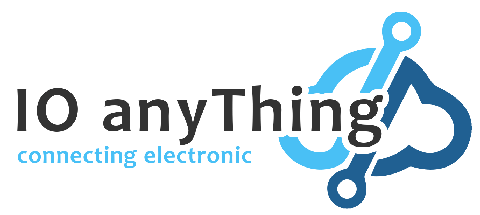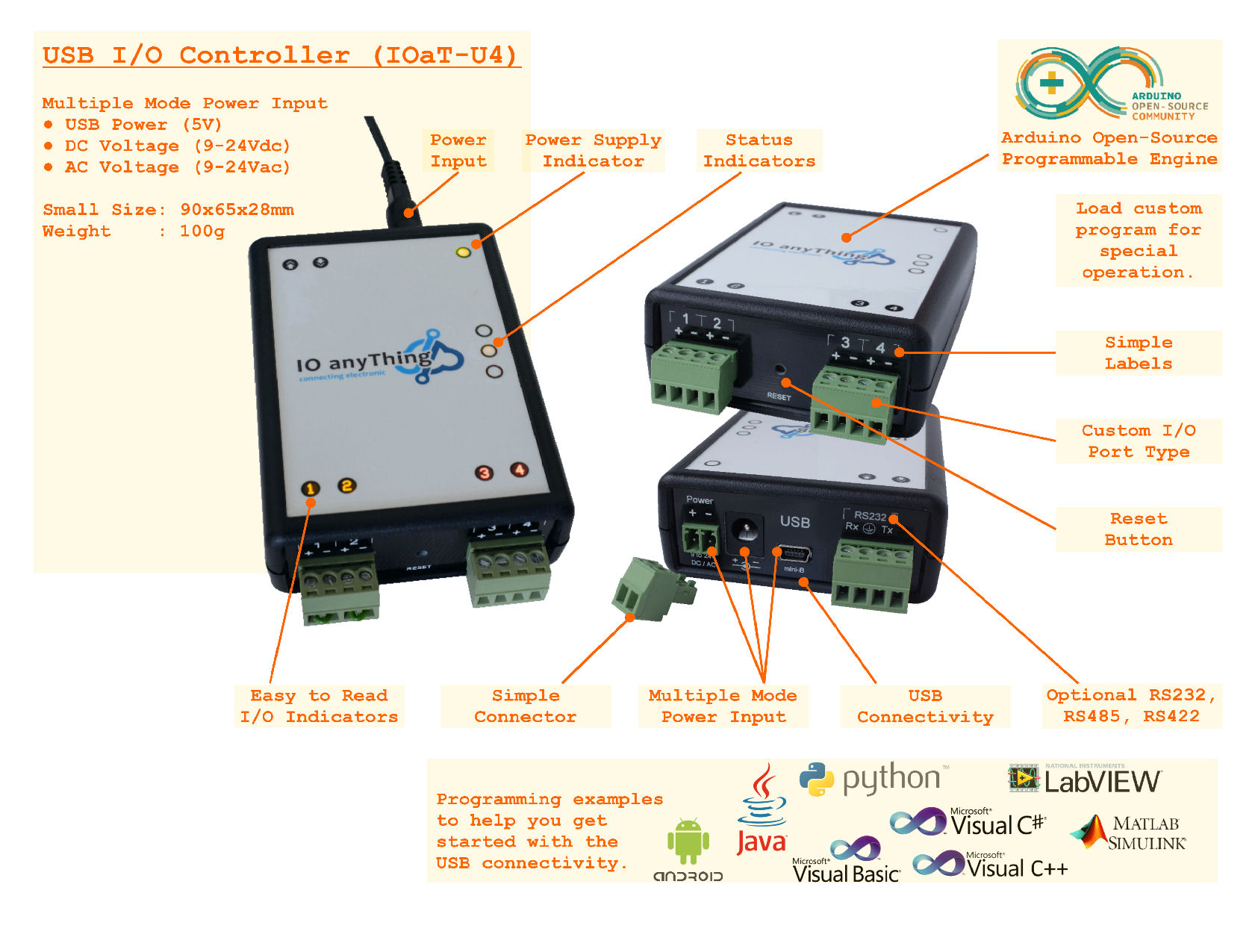The USB I/O controller product PIC-113 (obsolete) is now replaced by IOaT-U4 (new design!!!). For more information on this new controller product, please visit the IOaT-U4 product page on www.ioanything.com
Check out this new small size USB I/O Controller product with a portable enclosure.
This controller has the output option to control electronic devices and the input interface to sensors, allowing you to control other electronics from your computer USB interface.
Power input options are flexible, allowing a wide range of voltage from 9V to 24V. You can power it up from USB port, standard AC-DC adapter, or portable battery. Click here to check out more power options for this USB I/O Controller.
This USB I/O controller is base on Arduino open source programmable engine. A standard Arduino source code is available which allows you to customised your own USB controller behaviour. Read sensor input and control output for electronic devices using Arduino.
Click to enlarge the product information poster.
For the software developer, software examples coded in various programming languages is available to help you kick start the development work for USB control.
Control electronic devices via the USB I/O controller.
4x I/O ports available with options for input sensor and output control.
The controller accepts a wide range of power input with a voltage range from 5V, 9V to 24V.
Check out more detail about this USB I/O controller.
You can buy IOaT-U4 online at IOanyThing.com,
or contact us for a quotation (for local business in Singapore).
PIC-113 USB I/O Controller
The following is the information for PIC-112 (obsolete and is no longer in production).
Product
| Product: | USB+RS232 I/O Controller |
| Code: | PIC-113 |
Description
PIC-113 is a USB-connected I/O controller which allows you to control on/off, or control/drive external hardware devices. It has inputs which allow the interface to sensors or a simple contact switch. Command can be sent via the USB (virtual com port) or RS232 port by opening a communication port through your software. Communication stream can be opened using the standard library from the typical C#, C++, Visual Basic, Java, etc… programming language.
We are able to customise the device for up to 4x input, 4x output. Analog input, PWM output can also be customised to your need. Proprietary RS232 protocol can also be implemented through the RS232 port. For ethernet version, please refer to our other product PIC-112 Ethernet I/O controller.
![USB/RS232 IO controller [PIC-113]](https://www.pic-control.com/product/pic-113/images/PIC-113_2.png) |
![USB/RS232 IO controller [PIC-113]](https://www.pic-control.com/product/pic-113/images/PIC-113_4.png) |
![USB/RS232 IO controller [PIC-113]](https://www.pic-control.com/product/pic-113/images/PIC-113_1.png) ![USB/RS232 IO controller [PIC-113]](https://www.pic-control.com/product/pic-113/images/PIC-113_3.png) |
Features
Enclosure (available separately) |
Wiring Interface
Interfacing this board I/O to your system or component is simple. Check out the I/O interface wiring guide providing you with pictures and illustration examples.
Communication Interface
The device has an RS232 port and can be an interface to devices like Computer, PC104, iPhone, Arduino or other controllers. The connection allows the I/O to be controlled.
Source Code (Drivers and API examples)
Use Java, Visual Basic/C++/C#. Source code examples are available for download as follows,
Driver for PIC-113
PIC-113 USB Driver (for Win8, Win7, Vista, WinXP sp3)
Note: For Win8 user, you may need to disable the digital signature enforcement by Win8, in order to install this driver successfully.
Java Software Example
Java example to control PIC-113 USB+RS232 I/O controller.
pic113java.zip (size: 1.3MB)
NOTE: Please read the “readme.txt” file located at the root of the project folder
Visual Basic Software Example
—not available yet—
Visual C# Software Example
Visual C# Sharp example, present a control panel which allows you to control the output and read the input of this USB Controller [PIC-113].
pic113csharp.zip (size: 70KB, Microsoft Visual Studio Express 2015 for Windows Desktop)
Screen Shot of the Visual C# example for this USB I/O Controller
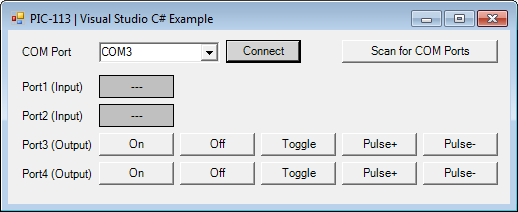
Select the COM Port number and click on the “Connect” button to connect to PIC-113.
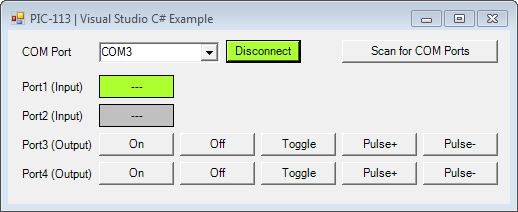 Green indicator, indicates PIC-113 is connected and also the status of the input 1 & 2. Click on the rest of the button to control the output port 3 & 4.
Green indicator, indicates PIC-113 is connected and also the status of the input 1 & 2. Click on the rest of the button to control the output port 3 & 4.
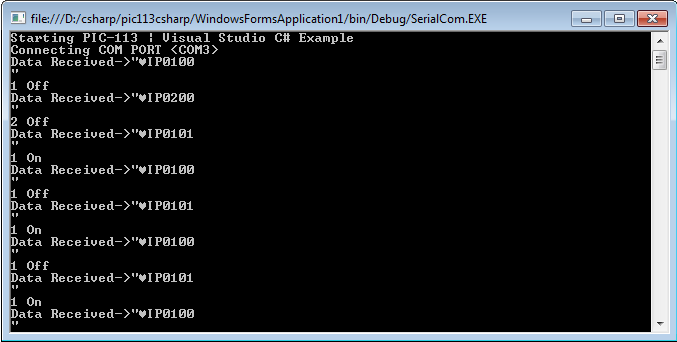
Console output, printing out the log messages.
Visual C++ Software Example
—not available yet—
